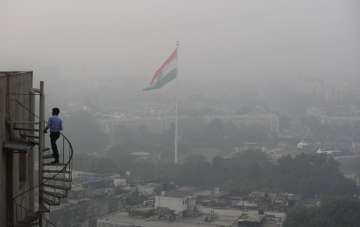Air quality in the national capital deteriorated to 'severe' on Thursday as the level of pollutants continues to rise. According to the Delhi Pollution Control Committee data, the Air Quality Index is at 401 in Anand Vihar, 405 in Alipur and 410 in Wazirpur; all three in 'severe' category. An AQI between 0and 50 is considered 'good', 51 and 100 'satisfactory', 101 and 200 'moderate',201 and 300 'poor', 301 and 400 'very poor', and 401 and 500 'severe'.
The national capital witnessed a thin layer of smog this morning, reducing visibility in various parts of the city. Amid the rise in pollution levels here, people are also experiencing problems with breathing.
According to experts, the severe category affects the health of people and seriously impacts those with existing diseases.
Amid the rise in pollution levels, people are having problems with breathing and some children have started facing throat problems due to contaminated air.
Earlier on Wednesday, Ministry of Earth Sciences' air quality monitor, SAFAR had said the air quality in Delhi will deteriorate by Thursday.
Meanwhile, the Supreme Court-mandated EPCA has suggested stricter implementation of the apex court's directions to curb stubble burning, implementation of parking policy and massive augmentation of public transport in Delhi-NCR to control air pollution in the coming years.
In a report submitted to the SC last month, the pollution watchdog said both in-situ and ex-situ measures need to be taken such as providing incentives and machinery to farmers for management of crop residue.
The Environment Pollution (Prevention and Control) Authority stressed the need for the transition to clean fuel for combustion in industries across the National Capital Region and restriction on the use of coal as it is a key contributor to pollution in the region.
Time-bound and urgent implementation of the SC directions on phase IV of the Delhi Metro, construction of different phases of Regional Rapid Transport System (RRTs) and augmentation of buses in Delhi are among measures suggested by the EPCA to control air pollution in the coming years.
It also called for time-bound implementation of the parking policy for NCR so that there are adequate restraints on vehicular traffic and growth and urgent and massive augmentation of public transport in the region.
Implementation of SC directions on the agreed 2022 schedule for thermal power plant emission standards will be needed to control air pollution in the coming years, it said.
Latest India News
